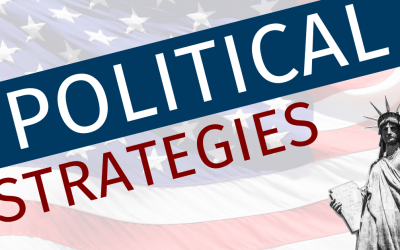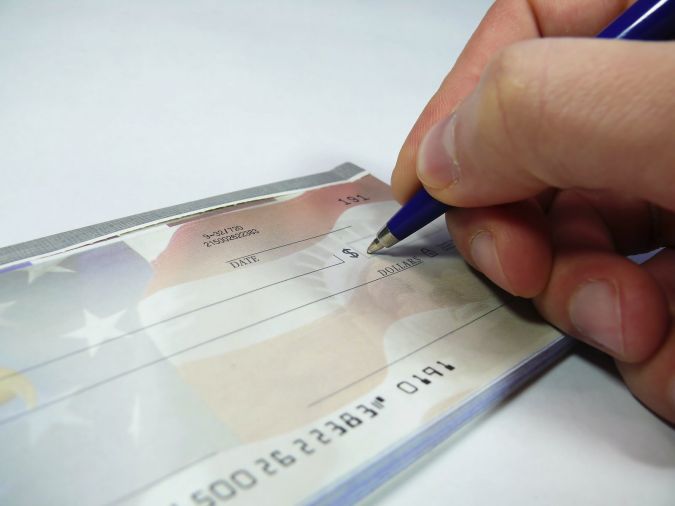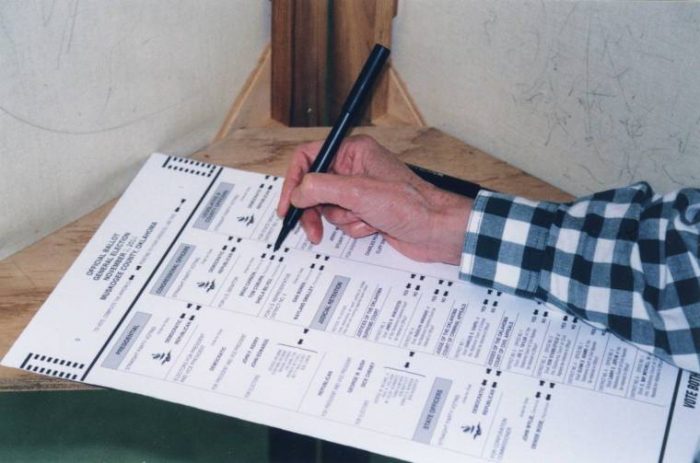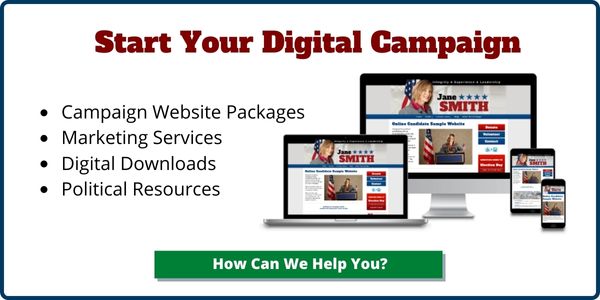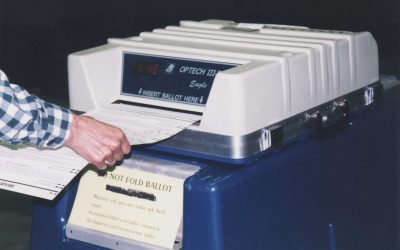10 Essential Strategies for Successful Political Campaigns
The success of a candidate hinges on more than just their charisma or the popularity of their political platform. Winning is the result of a combination of strategy, good policy, public engagement, and sometimes a bit of luck.
Here are ten strategies addressing the most important elements of a political campaign. Our focus will be on proven political campaign ideas that can help you win at the polls.
| Strategy | Key Focus |
|---|---|
| Early Planning and Team Assembly | Start with early organization and build a skilled team |
| Understanding the Political Landscape | Focus on voter-relevant issues and influential community leaders |
| Competitor Analysis and Strategy Development | Analyze opponents to guide messaging and highlight strengths |
| Developing a Clear and Relatable Campaign Message | Create a convincing, memorable message and slogan |
| Effective Use of Digital Tools and Social Media | Leverage online platforms for engagement and promotion |
| Field Organizing and Voter Contact | Direct voter engagement through volunteers and community canvassing |
| Building Community Support and Visibility | Engage in local events and maximize public speaking opportunities |
| Handling Misinformation and Negative Campaigning | Prepare for and respond to misinformation with clear messaging |
| Get Out The Vote (GOTV) Strategies | Intensify voter engagement efforts as election day approaches |
Plan Early and Put Together Your Campaign Team
An effective political campaign begins long before any formal announcement. Victory starts with careful planning and strategizing each step of the election process. Knowing what’s coming will help you prepare for the unexpected.
An organization is only as good as its people, and a single person can rarely win an election by themselves. At the very least, every candidate needs a campaign manager to help organize. Start putting together an effective campaign team as soon as you can. You’ll want individuals with a range of skills to fill in the positions of fundraising manager, volunteer coordinator, and communications director. Friends are good, but people with professional experience are even better.
The bulk of your campaign’s efforts will involve raising and spending money. Early planning opens the doors for early fundraising. As you reach out to early donors, you’ll start to build your network of financial backers and volunteers. Those efforts can then help kickstart your voter outreach efforts. That way, when election season arrives, your campaign is already in motion and growing momentum.
“Victorious warriors win first and then go to war, while defeated warriors go to war first and then seek to win.” – Sun Tzu

Understand the Political Landscape
The only issues that your campaign should focus on are those that voters care about. For example, while the issue of littering is important, it might not be the top priority for most people in your town or city. It’s hardly the sort of issue one would stake a candidacy on. Instead, focus attention to issues like employment, education, and taxes. Voters are motivated by these concerns because they directly affect their lives.
Determine who influences the voters and why. Then develop focused outreach strategies for engaging them. Identify influential community leaders, interest groups, and activists. Understand their needs and engage those concerns through your outreach efforts.
Social media can be a useful tool in measuring voter attitudes. But remember that the most vocal online voices do not always represent the majority. Use social media as just one of many resources to understand your political environment.
Tip: We’ve found that local elections lend themselves well to voter targeting based on issues rather than demographics. For example, one area of town may have water problems, while another neighborhood may be dealing with a large construction issue. Focus your specific solutions to residents of those particular areas.
Competitor Analysis and Strategy Development
A smart campaign learn all they can about their opponents, and keeps a close eye on them. Analyzing your competitors helps you counter their narratives and guides your own messaging. For example, if an opponent claims to be the most experienced, you can highlight your fresh perspective and innovative plans.
Here’s how to add detail and examples:
- Highlight Innovation Against Experience: Let’s say your opponent has a long tenure in office. While they may highlight their stability and steady leadership, you might want to focus on innovation and new ideas. In this case, you’ll want to stress how your qualities make you the real candidate for change.
- Contrast Styles: Is your opponent very formal and appear unapproachable? Capitalize on this by being more approachable and relatable. Be this way not only to the public, but also for the media.
- Focus on Issues that Highlight Your Strengths: If your competitor is fixated on broad issues, go local with your strategy. Concentrate on specific (but important) voter concerns.
- Use Data to Your Advantage: Utilize demographic voter data to identify areas where your opponent’s support may be weaker. Tailor your message to appeal to these voters.
- Leverage Social Proof: Get endorsements from local figures and organizations as early as you can. Use these endorsements in your messaging to show broad community support.
Underscore what sets you apart from the opposition. This strategy gives voters a clear choice on the ballot and allows them to easily understand why you are the better choice.
ABR, or Always Be Ready: Be ready to pivot as new information comes to light. Keep your strategy dynamic and responsive to the changing landscape.
Develop a Clear and Relatable Campaign Message
Now we’ve reached the essence of campaigning: your message. In order to establish credibility with the voters, your message must to be clear and convincing. What you stand for should be easy to summarize and remember.
You should also be able to answer the question of why you are running for office. Whittle down your broader message into a powerful slogan.
As you put together your campaign platform, start developing your talking points. Have an elevator speech prepared and ready for those moments when you need to speak on the fly.
And make sure that your message stands out from your opponents’. For instance, if an opponent focuses on broad, national themes, your campaign could concentrate on local issues. Show how your agenda directly benefits the day-to-day lives of voters. Give them a solid, compelling reason why they should choose you name on the ballot. Don’t be a “me, too” candidate. A clear position helps your message cuts through the noise.
Related: Developing Strong Messaging for Your Political Campaign
Make Effective Use of Digital Tools and Social Media
If you plan to run a serious campaign, you’ll need an online presence. This starts with a user-friendly website. (You may want to consider Online Candidate.) This is your campaign’s digital headquarters, the go-to place for everything about your campaign. It should tell your story, share your policies, offer ways to get involved, and provide a way to accept donations.
Next, let’s talk about social media. It’s not just about being present; it’s about being active.
- Build a Strong Network: Use platforms like Facebook, Instagram, and X/Twitter to create a community around your campaign. Engage with supporters and keep them informed.
- Personal Engagement: Connect with voters on a personal level through social media. Share behind-the-scenes content, respond to comments, and join conversations.
- Promote Strategically: Announce events on social media to increase attendance. Use these platforms to drive traffic to your website, where visitors can learn more or donate.
- Invest Wisely: Facebook ain’t free. And don’t count on any social platform to get the word out unless you allocate funds for online advertising. Paid promotions can target specific demographics, enhancing your visibility and reach.
Use software to improve operations.
- Streamline Coordination: Use software to coordinate your team’s efforts. This could be off-the-shelf groupware software, Google sheets and documents, or political software that tracks volunteers and donors.
- Make Data-Driven Decisions: Analyze social media metrics to tailor your approach. Learn what resonates with your audience and adjust your tactics accordingly. Track what fundraising appeals have the best response rate.
Email and text messaging also play an important role in outreach. With these strategies in play, your digital campaign can become a powerful tool to build support and raise more money.
Related: 9 Proven Social Media Strategies for Political Campaigns
Field Organizing and Voter Contact
Field organizing is the backbone of your direct voter engagement. It starts with putting together a team of enthusiastic volunteers. These individuals are the face of your ground campaign. They help spread your message directly to voters. Here’s how you can effectively manage this critical aspect:
- Recruit and Organize Volunteers: Start by recruiting a passionate volunteer team. To start, they can be relatives and friends. Later on, you’ll attract others to your cause. Use online platforms, community meetings, and local events for recruitment. Once you have your team, organize them effectively. Assign roles based on their strengths and interests.
- Door-to-Door Canvassing: In the age of AI and slick marketing, traditional outreach can be a powerful tool. Volunteers going door-to-door can have meaningful conversations with voters. They can share your vision and hear directly from your constituents. Don’t underestimate one-on-one contact.
- Community Canvassing: Beyond individual homes, engage with voters at community events. Set up booths at local fairs, parades, and markets. This broadens your reach and enhances visibility. (See below.)
- Building Personal Connections: In every interaction, emphasize personal connection. Train your volunteers to be friendly and to listen to voters’ concerns. They should be able to address these concerns with information about your campaign’s policies.
- Integrate with Social Media: Use social media to amplify your field efforts. Share updates and stories from the field. Encourage volunteers to post about their experiences and share campaign posts. This digital support can widen your campaign’s reach.
Through these strategies, your campaign can establish a strong presence in the community. Remember, every handshake, every conversation, and every shared story brings you closer to persuading voters and gaining their trust.
“Alone we can do so little; together we can do so much.” – Helen Keller
Build Active Community Support and Visibility
Building community support and increasing campaign visibility are keys to any successful political campaign. Here’s how to effectively engage with the community:
Participate in Local Events and Town Halls:
- Make your presence felt at local events and town halls. Speak up about the issues that matter to you. These are prime opportunities to meet constituents face-to-face.
- Host booths at community fairs or festivals. Here, you can distribute campaign materials and have direct conversations with voters.
- Hold Q&A sessions at town halls. Use these platforms to address local issues and present your solutions.
Maximize Public Speaking Opportunities:
- Seek out speaking engagements at community gatherings. These could be at local clubs, schools, or other community venues.
- Tailor your speeches to your specific audience. Address specific community or organization needs and concerns in each setting.
- Engage the audience with interactive segments. This could include Q&A sessions or discussions about community issues.
Early and Effective Online Presence:
- Establish a solid social media presence early in your campaign. Most candidates create a presence on Facebook, X/Twitter, and Instagram. Some may also use Tik-Tok or Snap. Only create accounts that you plan to use. Regularly update your accounts with campaign news, event information, and your stand on various issues.
- Use social media to highlight your involvement. Share photos and stories from events. Consider broadcasting direct, such as through Facebook Live.
- Engage with followers by responding to comments and messages. This helps build a personal connection with the wider community.
By integrating these strategies, you can effectively enhance your campaign’s visibility. Whether it’s through personal interactions at local events or engaging with a wider audience online, they all help build a strong, community-focused campaign.
Handling Misinformation and Negative Campaigning
Politics often goes negative. Online politics often takes negativity to the extreme. Misinformation, negative comments, and online ‘whisper campaigns’ are rampant. Any candidate needs to have a thick skin.
Here’s how to handle these challenges:
Be Prepared for Misinformation:
- Misinformation can come in many forms and can spread quickly. It might be a twisted fact about your policies or a lie about your personal life.
- The rise of AI technology has added fuel to the misinformation fire. Deepfakes and AI-generated fake news can make misinformation more convincing than ever. Unfortunately, this problem is going to get worse in the coming cycles.
Always Have a Quick Response on Social Media:
- Respond swiftly to any misinformation across all platforms. A quick, fact-based rebuttal can help stop these narratives before they spread.
- Directly engage with followers who post or spread misinformation. Call them out. Clarify your stance and correct inaccuracies in a respectful manner.
Maintain a Clear and Consistent Message:
- If your campaign message is clear and consistent, it’s harder for opponents to twist your words or intentions. A prime example is John Kerry’s experience. When messages are muddled, opponents can easily twist words and intentions.
- Repeat your key points in every communication. Repetition helps build your narrative.
Educate Your Supporters:
- Equip your supporters with the facts. They can help fight back against misinformation as they encounter it.
- Stay vigilant and responsive. A proactive approach, backed by strong and consistent messaging, is your best defense against negative campaigning.
GOTV (Get Out The Vote) Strategies
As election day draws near, your GOTV, or Get Out the Vote, efforts is the culmination of your work. A strong final push can significantly impact election results. Here’s how to approach it:
Develop Comprehensive Engagement Plans:
- Organize targeted activities for polling day. These could include deploying volunteers at polling stations, providing transportation services, making reminder calls and texts, promoting an ‘I Voted’ social media campaign, and monitoring voter turnout.
- Focus resources on areas where you have strong support. Consider increasing door-to-door canvassing, targeted digital advertising, and mobilizing local volunteers for more effective grassroots outreach.
Identify and Target Supportive Voters:
- Use voter data to identify those who are likely to support your campaign.
- Reach out to these voters personally. Make sure they know when and how they can vote for you.
Intensify Efforts in the Final Week:
- The week before the election is crucial. Increase the intensity of your GOTV efforts during this time.
- Use final mailings, phone calls, texts, and door-to-door visits to remind supporters to vote. Every touch point counts.
Plan for Early Voting:
- Develop a strategy for early voters. This is becoming increasingly important as many voters today use mail-in and early voting options.
- Provide information on early voting availability. Help make it as easy for your supporters to cast their votes early. This can be as simple as posting information to your website and reminding supporters on social media and through print material.
Utilize Digital Tools:
- Leverage social media and digital platforms for reminders and encouragement.
- Create and share content that motivates supporters to head to the polls.
- Arrange for drivers to take people to the polling stations on election day.
Remember, a strong GOTV strategy isn’t just to get supporters to the polls. Make them feel part of a larger movement. This can help turn their support into tangible votes.
Frequently Asked Questions
Start your digital campaign! Online Candidate helps hundreds of campaigns every election cycle. Find out what services are best for you.
The Power of Branding Your Political Campaign
It doesn’t matter if you are part of the establishment or a complete outsider; every political campaign needs a brand in order to effectively communicate with voters.
Today, this is more than just a logo, colors, and slogan. How you show up in public and online shapes how voters see you.
Here are tips to create and enhance your political branding.

Stake a claim to your political brand
If you want to know how to brand a political campaign online, it starts with the basics. Get your campaign domain name, X (formerly Twitter) account, and Facebook page as early as possible. Use a similar name for each, so someone can easily tell that they are from the same campaign. For example, a candidate named Jane Doe might choose handles like @JaneDoeForOffice or @VoteJaneDoe across all platforms for uniformity.
Whatever you do, don’t start advertising or having print materials created before you have your website and/or social media accounts under your control. We once had a client who had printed materials before they registered their campaign website domain name. And guess what? It was already taken. The client had to register another domain and toss out a whole lot of flyers.
“The best strategy for building a personal brand is to be 100% ‘you,’ without watering down your personality in any way.” – Gary Vaynerchu
Keep a consistent look across all platforms
One of the first things you’ll want to do is decide on your color scheme and logo design. Take some care in deciding these things, as it is never a good idea to switch your look during a campaign.
Once you have your colors, you’ll want a good campaign logo design that reinforces your campaign brand. Even your font selection and imagery contribute to the overall look. There are certain conventions that political campaigns adapt. In the United States, for example, this often includes standard block lettering, red-white-blue color themes, and a more horizontal layout.
Here are several political logo examples that we’ve designed for our clients:
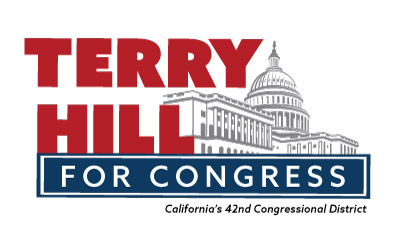
The capitol building is incorporated into the logo because the candidate is running for – you guessed it – US Congress.
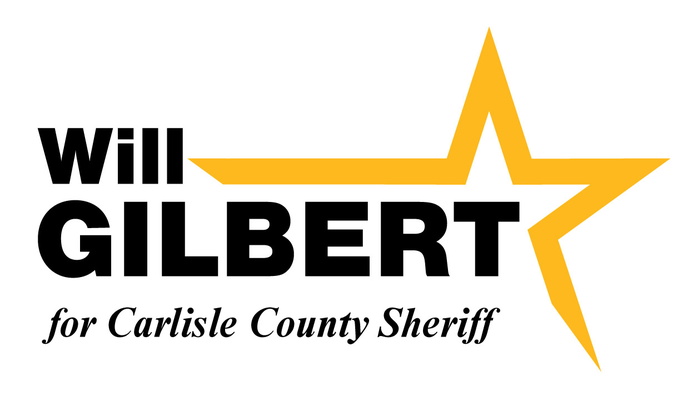
The star symbol indicates that the candidate is running for county sheriff. It a has a solid font, emphasizing the candidate’s last name. This design works well for law enforcement candidates.

In this logo example, the legislative district has been incorporated into the look. Note the traditional block lettering rather than a serif font.
If you are an underdog and really want to stand out from the crowd, switch up your fonts and colors. This is why many independent candidates tend to go with yellows, greens, and purples in their designs. Having a tall logo rather than a wide one will stand out. However, it might be a little difficult to adapt to signage and print pieces, such as letterhead.
If you’re running as an outsider, a different visual style can help you break through the noise. Once you commit to a look, stick with it.
TIP: Put together a brand guide that defines your logo, color scheme, typography, and voice. This keeps everything aligned no matter who on your team creates materials.
Emotional and value-based branding
To build a strong political brand, you need to convey related values and connect emotionally. A short personal story about why you’re running can help voters understand your motivation and what drives your decisions. This fosters trust and relatability, making voters and volunteers feel more invested in you and your campaign.
Case Study: Barack Obama’s “Hope” campaign effectively used storytelling and aspirational messaging to connect with a broad audience. Similarly, Donald Trump’s “Make America Great Again” slogan reinforced a clear emotional appeal to his target demographic.
Free Digital Campaigning Tips: Subscribe for free political campaign guides and updates.
Consistency beyond color and font
Use your campaign logo and color scheme as much as you can. Take social media, for example. Both Facebook and X/Twitter allow you to add an image to the top of your page. While they both have different dimensions, the header images should have a similar look and feel. On Twitter, you can even adjust the colors of your profile page. Even your campaign emails should have a consistent look to them.
If your strategy is to present yourself differently than your opponents, choose visuals and phrasing that reinforce that and use them consistently.
TIP: Have your personal photographs taken by a professional. Select a few good photos and use them consistently on your website and social networks. That way you will be recognizable across multiple online platforms and offline mailings. Add them to your media kit.
Maintain a single winning voice
Ever wonder why politicians use the same phrases over and over (and over) in speeches and interviews? It’s all part of branding a consistent message. This is why political speech tends to be simple, with easily repeatable catchphrases, rather than nuanced and detailed.
Many times, political candidates will stick to an effective campaign slogan. A good slogan will summarize a campaign in a short, memorable phrase. Sometimes it is so important that it is incorporated into a campaign logo.
Content should also be part of your brand. Remain consistent in the tone of your website and social media content. Your material should match previously stated policies and issue positions. Even if others post for your campaign, the ‘voice’ should remain the same. Stay clear, consistent, and positive.
Don’t make everything you post lifeless and dry, as if it were vetted by a dozen public relations experts. Add moments of personality and let people see who you are. Give an opinion. Share an observation. Post photos and video from the campaign trail.
“There’s power in allowing yourself to be known and heard, in owning your unique story, in using your authentic voice.” – Michelle Obama
Enhancing Your Brand with a Style Guide
Enhance your political campaign’s brand with a focused approach to your style guide:
- Collaborate: Once everyone has settled on the design and is sure that it meets the needs of campaign, put together a style guide ‘bible’. A well-defined style guide will ensure brand unity across online and offline messaging.
- Gather and Centralize Assets: Collect all visual elements, including logos, photos, and fonts. Store them on cloud services or shared drives for easy team access. This ensures style guide accessibility and that everyone is using the same base creatives for consistency.
- Provide Clear Examples: Use the style guide to demonstrate correct and incorrect logo usage. You’ll want to include visual do’s and don’ts to prevent common errors. Include reminders to keep colors accurate and proportions intact.
- Create Templates: Develop templates for emails, social media posts, and documents. This makes everyday content easier to produce and keeps everything uniform.
These small steps keep your visual identity consistent and recognizable.
Branding doesn’t end after Election Day
Branding doesn’t end after Election Day. Maintaining a consistent brand post-election helps build trust and keeps supporters engaged for future campaigns. Continue to use your brand in thank-you messages, social media updates, and public appearances. By doing so, you create a foundation for future elections or public service initiatives, reinforcing your identity as a leader.
A well-defined (and liked) brand helps your message cut through the online clutter. That ability to get attention when you need it will be critical when you need to get out the vote.

Branding can help you win your election. Maintain consistency throughout your campaign, and keep it going even after Election Day.
FAQ: Political Campaign Branding
How early should a campaign develop its brand?
As soon as you decide to run. Secure your domain and social handles, choose your visual style, and set a consistent message before announcing. Early branding prevents confusion and avoids rework later.
Do small, local campaigns really need a brand?
Yes. Voters rely on visual cues and repetition. Even a simple logo, clear color scheme, and steady message help you stand out on signs, mailers, and social media.
What makes a political slogan effective?
A good slogan is short, clear, and easy to repeat. It should reflect your core message and connect to what voters care about. If it takes too long to explain, it won’t stick.
How can outsider or independent candidates stand out?
Use distinctive colors, shapes, and phrasing that contrast with traditional red/blue campaign designs. Visual differentiation helps voters remember you, especially in crowded races.
Should candidates use the same photos everywhere?
Yes. A consistent set of high-quality photos helps people recognize you across mailers, signs, websites, and social media. Switching between unrelated images weakens familiarity.
Do I need a style guide for a small team?
A short style guide still helps. It keeps your logo, colors, fonts, and tone consistent—even if you only have a few volunteers creating content.
Free Download: Campaign Branding and Marketing Checklist [PDF]
If you’d like help building a brand that fits your message and connects with voters, we’re happy to walk you through your options.
The Beginners Guide To Building a Political Website
Building a political website for your campaign can be a daunting task, but it’s an important part of your digital strategy. Your campaign website is a vital tool for educating constituents about your values, platform, and key issues.
Today, a website is the online hub for political organizations of all sizes. The first presidential websites were launched in 1996. But it took almost two decades for local campaigns to take building a political website mainstream. Today, all serious candidates and organizations have embraced the internet. It is a major source of donations and plays a large part in shaping voter’s opinions.
In this post, we will go through the process of building a website for a political campaign. We will work our way step-by-step through the process.
Table of Contents:
- Why Do You Need a Political Campaign Website?
- Should You Create a Campaign Website Yourself?
- Political Domain Names and Hosting
- Free Website Hosting – A Warning
- Designing Your Campaign Website
- Creating Effective Campaign Website Content
- Compelling Images and Graphics
- Search Engine Optimization
- Setting Up An Online Donation System
- Setting Up An Email List
- Tying It All Together
- After The Election – What Now?
- Conclusion
Why do you need a political campaign website?
A campaign website is a trusted hub for processing online donations, sharing a candidate biography, posting press releases, and providing voter registration information. It’s best to start building your website early in your campaign.
Building your website is something you want to do early when you begin your political campaign.
A political campaign brands itself with its selection of colors, fonts and logos.
A great election website engages voters. It is easy to navigate, and acts as a powerful fundraising tool. Combined with a smart online strategy, it can make the difference between an election victory or loss.
Should you create a site yourself?
You are running for office. You are not in this to learn the ins and outs of web technology.
Unless you’re skilled in web development, it’s more efficient to seek professional help. Learning the technicalities of website creation, like content management systems and domain registration, can be time-consuming and detract from focusing on your campaign’s messaging and strategy.
Heck, even registering a domain name can be a confusing experience for some people.
Most of our clients do not have a lot of technical experience. Their skills are mostly limited to email and Microsoft Word. They don’t know the difference between a CMS and GUI.
Yes, an individual can register a domain and cobble together a site. But for a newbie, that’s going to hours and hours of time. Time that’s better spent on activities that help you win your election.
A well-designed website should reflect your campaign’s unique character and branding.
In this post, we will go through the process of creating a website for a political campaign. We will also explain how Online Candidate can help you through each step of the process.
Political domain names and hosting
Your domain name represents your campaign online and in printed materials, so choose it wisely. Simple, easy-to-remember names work best. If your name is John Smith, go with johnsmith.com or the name that will appear on the ballot. If your name is already registered, try a variation (eg. electjohnsmith.com or votejohnsmith.com).
Most registrars allow you the option of a ‘private’ registration. This prevents the registrant’s name, address, email address, and phone number from being found online. Private registration helps reduce spam and, increasingly, phone solicitations. This is an option worth considering if you value privacy.
A free .com domain name is included with each Online Candidate site. You have a choice of domains, including .com, .org, .net, and specialized domain extensions such as .republican and .democrat. The domain is registered in YOUR name so you are in control if want to transfer the domain or change ownership.
A warning about free website hosting
Although the price is attractive, going with a free website hosting company is not a good idea. You may be forced to display outside ads on your website. Server space and bandwidth will be limited. The web host may have little customer support, and they may close shop without warning.
Free website hosting often lists sites as a subdirectory or subdomain of the host’s own domain. That makes your domain something like “yourcampaignname/thehostname.com” or “thehostname.com/yourcampaignname.” You may not be able to use your own custom domain – unless you upgrade. And then your hosting isn’t free anymore.
In the meantime, any links you may have from news sites or social media point still point to the host website. That can cause confusion in branding going forward.
Locked-in domain names. It is often difficult – if not impossible – to move a domain name if registered through a free service. We know of two very large services that make it nearly impossible for non-technical people to transfer or move their domains. If you decide you want to host elsewhere, you may find that you are ‘stuck’ and unable to transfer the domain. Sometimes registering a new domain is the only solution.
Online Candidate websites include hosting, email accounts and the SSL security. Your hosting and content management system is automatically set up when you order. Your domain name is also registered in your name, so you have control over it going forward.
Designing your political campaign website
Political sites, especially in the United States, tend to have a certain ‘look’ to them. The color scheme tends to run along red, white and blue. An image of the candidate is often prominent in the header. Best practices include frequent calls for visitors to donate and lend support.
- The colors of your website should be consistent with your other campaign material.
- Political colors do not have to be limited to the traditional red and blue (in the US).
- Be sure the site colors and logo match your print materials.
- Consistency builds familiarity.
A responsive website renders well on desktop computers, mobile phones, and tablets. Mobile internet usage is now greater than desktop internet usage. A proper political website design must provide a great user-experience across different devices and screen sizes. Google considers responsive design as an industry best practice.
Using templates to make the design easier
Most website builders include a way for users to design their own website. For the most part, they are template-based. Political website templates are pre-designed elements that lays out the main structure of a web page (such as a header or footer). It makes web design a lot easier for designers. Templates or templating systems are generally tied in to a content management system (CMS). This allows users to add their own text content and images to create a campaign website.
Our Monthly Option Website Package includes a built-in template system. Choose from politically-inspired header graphics, color schemes, fonts and text sizes to create a unique look.
Custom political web design to get the look you want
For website to design to be considered customized, a site must incorporate a brand’s specific design requirements. For a political candidate or organization, a brand includes a graphic logo, a candidate photo, custom fonts and color elements. You can achieve a large amount of customization with a template. But a custom design requires a graphics program like Photoshop to create various site elements.
Online Candidate website packages includes a Custom Design. We design a website header with a campaign’s colors, logo, background and candidate head shot. We also modify the site colors, font and background for a professional look suitable for any political campaign. (See examples of our political website designs.)

Creating effective political website content
Your website should include key sections like Home, Biography, Issues, Endorsements, News, Donation, Volunteer, Events, Voter Registration, and a Contact page. The content should be well-written and checked for grammar and accuracy. A great political website should inform (and maybe even entertain) the voters:
Make sure the content is clear, engaging, and regularly updated to reflect campaign developments. Be sure to include dynamic calls-to-action and visual storytelling to connect with your visitors. Some campaigns today are using AI tools for writing issue-related content, candidate biographies, and calls to action.
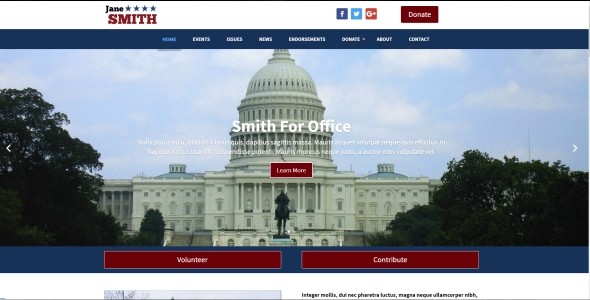
Use compelling images and graphics
Images and graphics can be just as important as your copy. Use compelling visuals that support your campaign’s message. Having photographs and images ready at the start makes the website creation process go smoother. Pictures people and faces attract user attention. If you are hiring a designer, they can make your images web-ready for desktop and mobile display.
Incorporate optimized images and graphics to enhance the visual appeal and convey your campaign’s message effectively. Images should be web-ready and appropriately sized for both desktop and mobile display.
Online Candidate websites include a built-in library of images to use within your content.

Search engine optimization is important
Optimize your website for search engines with the proper use of keywords, metadata, and also link out to your social media accounts. This helps ensure that your site ranks well in candidate-related searches.
Setting up an effective online donation system
Online fundraising is a powerful tool to bring in campaign donations. Without it, you are at a serious disadvantage. Accepting funds online can help you target a wider audience and tap into a greater quantity of small donations. People who hesitate to write a check (and who writes checks anymore?) are often more inclined to click and contribute online.
Online donations are a key component of campaign fundraising. Integrate a secure and user-friendly donation system on your website. Choose a service that offer low transaction fees and support multiple payment channels.
Establish your payment system early. To accept online contributions, you’ll need a campaign bank account and verification of your organization’s non-profit status. After that, you’ll need to comply with all legal requirements for collecting donations.
Regardless of how you raise funds, your campaign must comply with all financial legal requirements. You’ll need to collect certain donor information, and there will also be a legal limit on individual contributions. You should also note on your donation pages that political contributions are not tax-deductible.
Online Candidate websites can tie in with PayPal, Raise The Money, ActBlue, Anedot, or whatever fundraising service you choose.
Related: Comparing Political Donation Platforms – Our Recommendations
Setting up an email list to reach voters and supporters
The most effective way to get a quality email list is to build one yourself. You should start this as early as possible. Initial addresses can come from personal contacts, event signups, or through donation and volunteer forms (with a checkbox for ‘add to email list’).
Choose an email service that suits your campaign’s size and needs, focusing on personalization and segmentation for effective communication. For smaller campaigns, a free or low-cost solution like MailChimp might be enough. For lists with a large number of subscribers, a paid or higher-end option may be necessary.
Tying the elements together
A website should not stand alone. Effective political candidates take advantage of all that the web has to offer. With a website, a donation system and an email marketing setup, you have all the basics covered. Use analytics tools to track website performance and user engagement.
Before your site goes live, proofread all your site content (and have a few others proofread, too). Make sure all the forms on your website work properly. Test your email signup form and sign yourself up to receive updates.
After the election – what now?
After the election, you should post a final update. Win or lose, you should thank your friends and supporters for their help – they deserve it. Also, provide information on future campaign plans or activities. Consider keeping your site active for long-term engagement and future campaigns.
Conclusion
Building a political campaign website might seem like a huge job, but with the right approach, it’s manageable. Our expertise and tools make it accessible for candidates of all technical levels.
Hundreds of politicians and elected officials use Online Candidate every election cycle. We provide affordable political website packages and marketing services.
We hope that we can help you this election season!
Why Every Local Candidate Should Have a Campaign Manager
This year, there was a candidate in our area who managed everything herself. It was basically a one-person operation. She encountered early problems in organizing volunteers and raising funds. Volunteer interest waned as time went on. The problems continued as the candidate continually refined her message and tried to put together local advertising in the run-up to Election Day.
This candidate had won elections in the past, but in the last few races she did not have a campaign manager.
Unfortunately, she lost both elections.
The moral is: You can’t do it all alone.
The Complexity of Campaigns
Political campaigns, even for local office positions, are not simple. They all combine strategy, fundraising, volunteer organization, voter outreach and everything in between. Handling all these roles by yourself is overwhelming. That’s where a campaign manager comes in. They streamline these complex processes. This lets you focus on what you do best—engaging with voters and fine-tuning your message.
The Role of a Good Political Campaign Manager
A campaign manager has many roles. He or she primarily acts as a conductor, making sure every section of campaign comes in at the right moment. Here’s what else they manage:
- Strategic Planning: They set the overall direction and tactics of the campaign. You might think you know the issues and what voters find important, but an outside perspective can help you make the best decisions on strategy and tactics.
- Fundraising: They oversee the collection of funds. For example, yours might organize a high-profile fundraiser at a local restaurant and help make sure that key donors attend.
- Media Relations: They handle all media communications, particularly in smaller races. They might prepare you for a radio interview and craft press releases.
- Team Leadership: They keep the staff and volunteers moving towards common goals. They could coordinate weekly team meetings to ensure everyone is on track.
- Crisis Management: They solve problems swiftly to keep the campaign on track. For instance, if a negative news story breaks, they quickly devise a response strategy.
In smaller campaigns, managers may even take on the role of a volunteer coordinator. They ensure volunteers are engaged and motivated. It’s always better if someone else, rather than you as the candidate, is organizing training sessions to prepare volunteers.
The Value of Professionalism
A campaign manager adds a layer of professionalism to your campaign. Their expertise in managing detailed operations makes your campaign more effective. Without one, you’re likely missing out on opportunities to run a better campaign – and even risking a possible win.
Even in local campaigns, we’ve seen candidate perform better and more effectively when there is someone to guide the campaign activities and keep the candidate on track. When a candidate tries to run everything themselves, things go sideways – quickly.

In smaller campaigns, managers may even take on the role of a volunteer coordinator.
Choosing the Right Campaign Manager
When you choose a campaign manager, experience is key. Look for someone who has successfully managed campaigns before. They should be adaptable and a strong leader, not just a yes-person. While it may be tempting to hire someone you know, like a friend or relative, a professional is always a better choice.
If you can, hire a professional campaign manager who has previously led a successful campaign. Someone who has done so will bring with them tried-and-true strategies, an objective perspective, and invaluable experience. Someone who is more separated from your team and your issues is more likely to provide the unbiased advice that you’ll need to win.
Conclusion
Every successful campaign is driven by strong leadership, particularly from a skilled campaign manager. Even if you are running for a local position, there are benefits in having real management. They do more than just manage—they elevate your campaign and boost your likelihood of success. Remember, running a campaign is not a solo act. A campaign manager becomes your partner, ensuring everything runs smoothly.
When Should You Start Campaigning For Your Election?
If you are planning to run for office, you should start campaigning as soon as you can. That’s all. End of post.
No, not really. It’s a little more complicated than that.
Much of your campaigning will happen close to Election Day, but you need to plan out and lay the groundwork for your campaign much earlier.
Here’s a chart that lays out the optimal times to start based on your election type:

Typical campaign start times by election type
Here are the calendar milestones for basic campaign types:
Local Elections: For local elections, like those for mayor, city council, or district attorney, consider announcing your candidacy approximately 4-5 months before Election Day. After you announce, you should begin social media engagement. This allows you to connect with voters early and start building momentum. In the final stretch, or about 2 months prior to Election Day, you’ll switch to personal strategies, such as door-to-door canvassing. This type of grassroots activity provides personal voter engagement. Voters remember candidates who take the time to personally visit them.
State Elections: If you are going to run a state-level campaign for state representative and senator, you’ll need to start earlier. You should begin to build your donor network and secure endorsements about 1-1.5 years in advance of Election Day. Eventually, you’ll transition to public campaigning and voter outreach about around 9 months before voters head to the polls. In the final 6 months, your efforts should switch to holding debates, holding town halls, and making media appearances. This will help your message to reach as wide an audience as possible.
Federal Elections: Campaigning for federal office, such as US congress, has the longest lead time. You’ll want to start fundraising and networking efforts about 2 years before Election Day. At that point, you’ll be working to secure party support (perhaps through a primary) and establish a solid network of volunteers. About a year out from the election is when your campaign should fully launch. Then you’ll focus on widespread voter engagement and policy promotion. The complexities and scale of congressional and federal elections are huge, and it takes a large organization to make it happen.
What are the signs that it’s the right time to announce your candidacy?
Knowing the best time to announce your candidacy involves reading the political landscape and your own readiness. For example, there may be a gap in leadership that matches your strengths. Look at when successful campaigns in your area or in similar districts have started in previous cycles.
Finally, look at public sentiment. If constituents want change and your platform fits the voter’s demands, it’s a good sign to launch.
Secure your endorsements early
Early endorsements from influential individuals and organizations can lend credibility from the outset. Start identifying and reaching out to potential endorsers early in your campaign. Securing an endorsement can take time, so start these conversations early.
What are the potential disadvantages of beginning too early?
Starting a campaign too early can lead to several challenges. Voter fatigue is a real concern. If voters hear your message too long before an election, they might lose interest by the time voting rolls around. Early activity also give opponents a heads up on your plan and more time to analyze and potentially counter your strategies. They can adapt their messages in response to yours. This could put you at a strategic disadvantage early in the race.
What are the problems of starting a campaign too late?
A failure we’ve seen, particularly for local candidates, is that they begin campaigning too late. By the time they announce and start ramping up efforts, the election is only a few weeks away.
In our area, a local village candidate in a March election passed up an interview with a local newspaper bout a month or so before the election. The reason? He “didn’t want to tip his hat” about his candidacy. Be the time he made his formal announcement a few weeks before election day, it was too late. He didn’t have the time or budget to get the word out.
Not coincidentally, he lost the election.
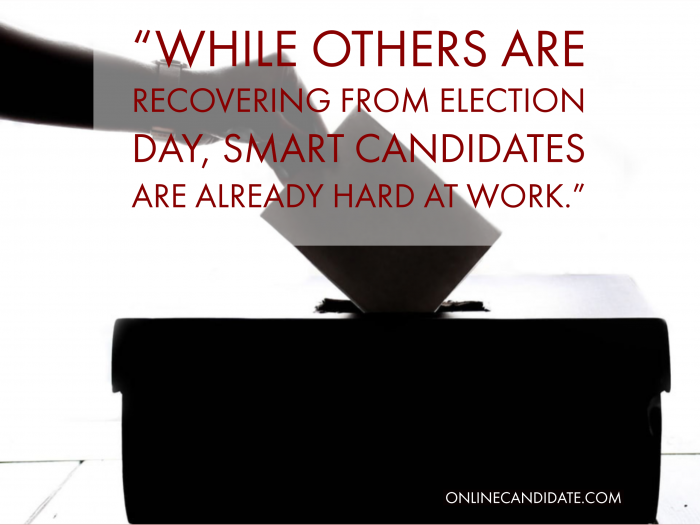
How has technology and social media changed the game?
Technology and social media has change how political campaigns start and run. Social media lets candidates connect directly with voters, making the campaign start more fluid. This means engaging with the community and building an online presence can happen well before an official announcement.
Not sure about running? Consider ‘testing the waters’
You may even want to ‘test the waters’ before deciding to campaign for office”. As a potential candidate, particularly for Federal office, may want to conduct polling or travel your district or state to see if there is enough potential voter support for your candidacy.
Some candidates are even using crowdfunding before they make the decision to run. That way they can secure seed money donations before they start campaigning.
Smart campaign managers and candidates are already looking ahead to the next election even before the current one is over. While others are still recovering from Election Day, the next cycle has already begun. Forward-thinking candidates are already hard at work.
Are you ready to run?
Some people may feel that they are too young or not sufficiently prepared to be a political candidate. Others wait until they have achieved more in life. Either way, the best time for starting a political campaign is an open-ended question with no easy answer.
Whenever you decide to run, give it your all, and keep up the momentum through Election Day!
Start your digital campaign with Online Candidate. We provide campaign website design and marketing services.
What Simple Question Can Increase Voter Turnout?
Sometimes elections, particularly local elections, come down to only a handful of votes. While all the moral support in the world is nice, a political candidate cannot win an election until they get their supporters to cast a ballot.
So how can a campaign get more supporters to actually turn out on Election Day?
One way is to simply ask, “Will you be voting in the next election?”
 Simply asking potential voters to predict if they will or will not vote on Election Day and having them provide a reason for their prediction can actually increase voter turnout. This was the conclusion of a study by social scientist Anthony Greenwald. When his team performed this experiment on potential voters on the eve of an election day, those who were asked to predict if they would vote had an actual turnout rate 25% higher than those who were not asked the question.
Simply asking potential voters to predict if they will or will not vote on Election Day and having them provide a reason for their prediction can actually increase voter turnout. This was the conclusion of a study by social scientist Anthony Greenwald. When his team performed this experiment on potential voters on the eve of an election day, those who were asked to predict if they would vote had an actual turnout rate 25% higher than those who were not asked the question.
This technique is based on two psychological principles.
The first is the compulsion of the person asked to agree to the ‘socially desirable’ activity.
The second is that because the person has publicly stated that they will perform the behavior, they will be more motivated to act in a consistent manner with their commitment. (And actually vote.)
So, how do you put this technique to use?
One way is to have campaign volunteers call known supporters and ask them if they will vote in the next election. Once they get a ‘yes’ answer, the volunteer should tell the supporter that they they will mark the person down as a ‘yes’ and will let others know as well.
Having the supporter make a public, voluntary declaration helps cement the voter’s commitment to show up at the polls or cast a mail-in ballot.
This tip can help motivate voters for both primaries and general elections.
For more information on this and other persuasive marketing techniques, check out the book Yes!: 50 Scientifically Proven Ways to Be Persuasive.

